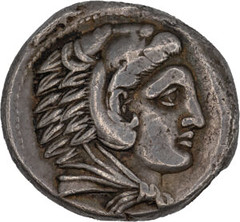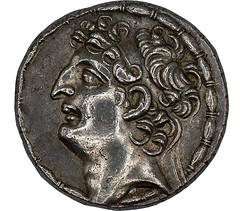
PREV ARTICLE
NEXT ARTICLE
FULL ISSUE
PREV FULL ISSUE
EXHIBIT: BIRTH OF PORTRAITURE: ALEXANDER THE GREATThe latest numismatic Nickle Galleries exhibit focuses on the coinage of Alexander the Great and his successors. -Editor
A portrait is typically defined as a representation of a specific individual. It does not merely record someone's features, but says something about their character and personality, offering a vivid sense of a real person's presence. The Birth of Portraiture: Alexander the Great & His Successors exhibition explores the life of Alexander the Great, his friends and generals who succeeded him after his death, and the later Indo-Greek Kings in Asia between the 3rd and 1st centuries BCE – through their portraits on ancient coins, the unprecedented realistic representations of the human likeness. The tradition of portraiture in the West extends back to antiquity and particularly to the Hellenistic period (323-30 BCE), where lifelike depictions of distinguished men and women appeared on coins. After many centuries in which cold, idealized, generic representations had been the norm, distinctive portrait likenesses began to appear at end of the 4th century and the early 3rd century BCE, starting with Alexander the Great (356-323 BCE). This change reflected a new growth of interest in everyday life and individual identity as well as distinctiveness.
In antiquity, the portraits functioned just as images in the popular culture today. Our relatively recent obsession with selfies, the self-portraits posted on social media, has the same origin as the Hellenistic coin portraits, which function as a self-study with the aim of a better understanding of oneself. Curated by Marina Fischer.
For more information, see:
Wayne Homren, Editor The Numismatic Bibliomania Society is a non-profit organization promoting numismatic literature. See our web site at coinbooks.org. To submit items for publication in The E-Sylum, write to the Editor at this address: whomren@gmail.com To subscribe go to: https://my.binhost.com/lists/listinfo/esylum All Rights Reserved. NBS Home Page Contact the NBS webmaster 
|


